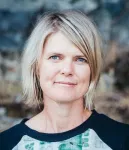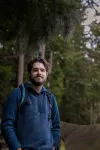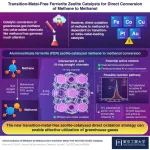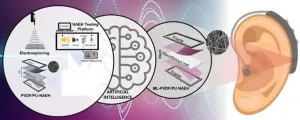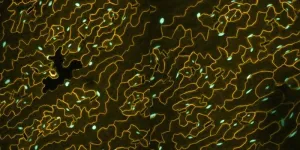(Press-News.org) A new proposal has emerged in response to the November 2021 floods that swept Sumas Prairie in the Fraser Valley, British Columbia, causing mass evacuations and millions in damages.
Instead of rebuilding the dykes to manage water flows and prevent future floods, scientists at UBC, along with members of the Sumas First Nation and other research partners, suggest an alternative: let Sumas Lake, which was drained in the early 1920s and converted into the farmland known as Sumas Prairie, return to its natural state.
This can be done by buying out properties on the lakebed – a solution that is projected to cost around $1 billion, less than half of the estimated $2.4 billion cost of repairing the dykes and installing a new pump station.
“Dyke rehabilitation programs tend to assume that future waterflows will be predictable, however climate projections show that flooding events are likely to increase in the future – and the water needs somewhere to go,” says study author Riley Finn, a researcher at the Martin Conservation Decisions Lab at UBC in a paper published today in Frontiers of Conservation Science.
“By restoring Sumas Lake – Semá:th Xhotsa – we can help the region adapt to future floods, facilitating climate resiliency in the long term. It is the most ecologically responsible solution for flood management in the region.”
Ecological reconciliation
The authors note that restoring the lake will also promote healthy food systems and ecological reconciliation, addressing the ongoing harms caused by the loss of the lake to the Semá:th people.
Before its conversion to agricultural land, Sumas Lake supported thriving populations of salmon, sturgeon, ducks, and food and medicinal plants, many of which are now endangered.
Chief Dalton Silver, Sumas First Nation said “For the Semá:th people, the lake represented life and livelihood. In 1924, the lake was drained in an instance of land theft, decimating an ecology that supported a rich and diverse Indigenous food system and replacing it with a settler food system.
“My grandpa used to say that in the Coast Salish Territory, Semá:th was the central location where the people used to gather. The people gathered in the summertime as we had Semá:th Lake that once offered every species of fish right there at the front of our village and in the wintertime, people gathered there from all parts of the Coast Salish Territory for the winter ceremonies.”
Managed retreat
The study integrates Indigenous laws and oral tradition and the concept of “managed retreat” – the purposeful relocation of people and infrastructure to safer areas.
“In a time when climate-change induced flooding is predicted to increase, our study shows that incorporating Indigenous laws and knowledge is essential for developing more sustainable and just solutions,” said Dr. Tara Martin, the study’s senior author and a professor of forest and conservation sciences at UBC. “We need to explore innovative solutions, not just build more dykes.”
Humans seem to want to build bigger and better infrastructure but it is always at the detriment of our ecosystem and environment, added co-author Murray Ned, a member of the Sumas First Nation and executive director of the Lower Fraser Fisheries Alliance.
“Mother Nature signaled to us in 1990 and 2021 that the spirit of the Semá:th Xhotsa is alive and well, and ready to return with or without our cooperation. This research demonstrates that there are more economical and logical options that would allow us to reconcile some of the past harms of draining the lake a hundred years ago, and still maintain agricultural opportunities and the farming community in the region,” said Ned.
Interview language(s): English
Available interviews:
UBC Faculty of Forestry
To arrange, contact lou.bosshart@ubc.ca
Riley Finn, Researcher, Martin Conservation Decisions Lab, Department of Forest and Conservation Sciences
Dr. Tara Martin, Professor, Martin Conservation Decisions Lab, Department of Forest and Conservation Sciences
Sumas First Nation - Chief Dalton Silver
To arrange, contact communications@sumasfirstnation.com
Murray Ned - To arrange, contact murray.ned@lffa.ca
Executive Director, Lower Fraser Fisheries Alliance
Governance and Tribal Advisor, Sumas First Nation
END
Researchers call for return of Sumas Lake following devastating 2021 floods
New paper finds restoring the lake will help in climate adaptation, endangered species restoration and Indigenous reconciliation
2024-06-03
ELSE PRESS RELEASES FROM THIS DATE:
Transition-metal-free zeolite catalyst for direct conversion of methane to methanol
2024-06-03
In light of the waste-to-wealth movement, technology for converting greenhouse gases into value-added materials has gained significant attention in recent years. One such technology is the catalytic conversion of methane into methanol, a widely used industrial solvent and raw material for chemical synthesis. The industrial process for conversion of methane to methanol is extremely energy and resource-intensive. In the past decade, scientists have developed several catalyst systems that can enable direct oxidation of methane to methanol. However, most of them are based on ...
Retrospective study based on electronic health records finds popular diabetes and weight-loss drugs associated with reduction in incidence and recurrence of alcohol-use disorder by at least half
2024-06-03
CLEVELAND—A new study by researchers at the Case Western Reserve University School of Medicine reveals that the popular diabetes and weight-loss drugs Wegovy and Ozempic are linked to reduced incidence and recurrence of alcohol abuse or dependence.
The team’s findings, recently published in the journal Nature Communications, may suggest a possible new treatment for excessive alcohol use—including alcohol-use disorder (AUD), a health condition that causes about 178,000 deaths in the United States each year, according to the Centers for Disease Control.
To date, the U.S. Food and Drug Administration ...
Enhancing nanofibrous acoustic energy harvesters with artificial intelligence
2024-06-03
(LOS ANGELES) June 3, 2024 – Scientists at the Terasaki Institute for Biomedical Innovation (TIBI), have employed artificial intelligence techniques to improve the design and production of nanofibers used in wearable nanofiber acoustic energy harvesters (NAEH). These acoustic devices capture sound energy from the environment and convert it into electrical energy, which can then be applied in useful devices, such as hearing aids.
Many efforts have been made to capture naturally occurring and abundant energy sources ...
Research pioneer and paradigm-shifting thought leader for breast cancer precision medicine to receive the 2024 Szent-Györgyi Prize for Progress in Cancer Research
2024-06-03
June 3, 2024 (Rockville, MD)
The National Foundation for Cancer Research (NFCR) is announcing that the blue-ribbon selection committee, composed of world-renowned research leaders and visionaries, has awarded the 2024 Szent-Györgyi Prize for Progress in Cancer Research to Dennis J. Slamon, M.D., Ph. D. from UCLA Health for his groundbreaking research discoveries that helped to shape the field of precision medicine for breast cancer patients.
The cancer research community will celebrate Dr. ...
Assessing the environmental and downstream human health impacts of decentralizing cancer care
2024-06-03
About The Study: This cohort study found that using decentralization through telemedicine and local care may substantially reduce cancer care’s greenhouse gas emissions; this corresponds to small reductions in human mortality.
Corresponding Author: To contact the corresponding author, Gregory A. Abel, M.D., M.P.H., email gregory_abel@dfci.harvard.edu.
To access the embargoed study: Visit our For The Media website at this link https://media.jamanetwork.com/
(doi:10.1001/jamaoncol.2024.2744)
Editor’s Note: Please see the article for additional information, including other authors, author contributions and affiliations, ...
Telehealth can significantly reduce greenhouse gas emissions associated with cancer care, study finds
2024-06-03
BOSTON – Telemedicine visits for cancer care may not only be more convenient and easier to schedule than in-person appointments, they're also better for the planet, new research by Dana-Farber Cancer Institute scientists shows.
Based on an analysis of data from a regional cancer center, the researchers calculate that, nationwide, cancer care that utilizes telehealth and local care would generate 33.1% less greenhouse gas emissions than the traditional model of in-person care, primarily because of reduced travel to medical appointments. ...
Brain waves shape the words we hear
2024-06-03
The timing of our brain waves shapes how we perceive our environment. We are more likely to perceive events when their timing coincides with the timing of relevant brain waves. Lead scientist Sanne ten Oever and her co-authors set out to determine whether neural timing also shapes speech perception. Is the probability of speech sounds or words encoded in our brain waves and is this information used to recognise words?
The team first created ambiguous stimuli for both sounds and words. For instance, the initial sounds in da and ga differ in probability: ‘d’ is more common than ‘g’. The Dutch words dat “that” and gat “hole” ...
Geographic distribution of clinical trials for advanced-stage cancer
2024-06-03
About The Study: This quality improvement analysis of clinical trials for metastatic breast, lung, colon, pancreatic, and prostate cancers found that a large proportion of the U.S. population lived within 30 miles of a clinical trial site. This finding suggests that while many clinical trials are available, they are not evenly distributed across the country and may not be accessible to all individuals, particularly racial and ethnic minority individuals. This disparity in access to clinical trials raises important questions about equity and fairness in the distribution of health care resources and opportunities ...
PSU secures $1 million grant for high-performance computing cluster across Oregon
2024-06-03
Portland State will power up a new high-performance computing cluster that will give researchers at universities and colleges across Oregon the ability to advance computing-intensive research projects by processing large datasets and performing complex computations in a fraction of the time — thanks to a nearly $1 million grant from the National Science Foundation’s Campus Cyberinfrastructure program.
The Oregon Regional Computing Accelerator (Orca) aims to provide free-of-cost computing resources and cyberinfrastructure ...
New $12.5 million National Science Foundation grant awarded to study phenomenon affecting agriculture, cancer, biodiversity and more
2024-06-03
It’s in your heart and liver, in the vegetables you eat, in the rogue cells that cause cancer. Those who live in temperate regions are surrounded by more of it than people who live in the tropics, and without it, humans wouldn’t exist.
It’s called polyploidy, and only within the last few years have biologists begun to recognize its significance across the tree of life.
“It’s one of the most important biological processes that hardly anybody knows about,” said Doug Soltis, a distinguished professor at the Florida Museum of Natural History.
Soltis is one of 18 scientists who have received a combined ...
LAST 30 PRESS RELEASES:
Antarctica sits above Earth’s strongest “gravity hole.” Now we know how it got that way
Haircare products made with botanicals protects strands, adds shine
Enhanced pulmonary nodule detection and classification using artificial intelligence on LIDC-IDRI data
Using NBA, study finds that pay differences among top performers can erode cooperation
Korea University, Stanford University, and IESGA launch Water Sustainability Index to combat ESG greenwashing
Molecular glue discovery: large scale instead of lucky strike
Insulin resistance predictor highlights cancer connection
Explaining next-generation solar cells
Slippery ions create a smoother path to blue energy
Magnetic resonance imaging opens the door to better treatments for underdiagnosed atypical Parkinsonisms
National poll finds gaps in community preparedness for teen cardiac emergencies
One strategy to block both drug-resistant bacteria and influenza: new broad-spectrum infection prevention approach validated
Survey: 3 in 4 skip physical therapy homework, stunting progress
College students who spend hours on social media are more likely to be lonely – national US study
Evidence behind intermittent fasting for weight loss fails to match hype
How AI tools like DeepSeek are transforming emotional and mental health care of Chinese youth
Study finds link between sugary drinks and anxiety in young people
Scientists show how to predict world’s deadly scorpion hotspots
ASU researchers to lead AAAS panel on water insecurity in the United States
ASU professor Anne Stone to present at AAAS Conference in Phoenix on ancient origins of modern disease
Proposals for exploring viruses and skin as the next experimental quantum frontiers share US$30,000 science award
ASU researchers showcase scalable tech solutions for older adults living alone with cognitive decline at AAAS 2026
Scientists identify smooth regional trends in fruit fly survival strategies
Antipathy toward snakes? Your parents likely talked you into that at an early age
Sylvester Cancer Tip Sheet for Feb. 2026
Online exposure to medical misinformation concentrated among older adults
Telehealth improves access to genetic services for adult survivors of childhood cancers
Outdated mortality benchmarks risk missing early signs of famine and delay recognizing mass starvation
Newly discovered bacterium converts carbon dioxide into chemicals using electricity
Flipping and reversing mini-proteins could improve disease treatment
[Press-News.org] Researchers call for return of Sumas Lake following devastating 2021 floodsNew paper finds restoring the lake will help in climate adaptation, endangered species restoration and Indigenous reconciliation
